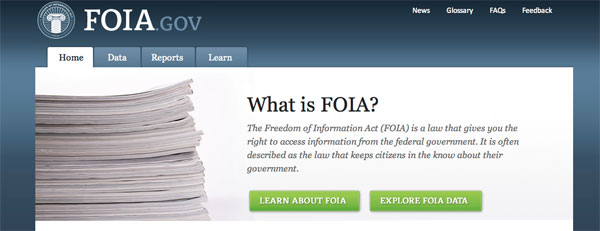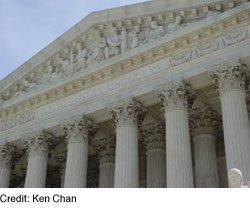 Watching events unfold at Japan’s Fukushima Daiichi Nuclear Power Plant over the past week have reminded me how little I really know about how nuclear power is regulated. While reading about and listening to commentary on the crisis has better acquainted me with the work and analysis of U.S. and international organizations that oversee and promote the operation of this technology, I still thought it might be useful for those of you who are interested, like me, in learning more on the issues to prepare a compilation of information and resources related to nuclear power laws, regulations and organizations.
Watching events unfold at Japan’s Fukushima Daiichi Nuclear Power Plant over the past week have reminded me how little I really know about how nuclear power is regulated. While reading about and listening to commentary on the crisis has better acquainted me with the work and analysis of U.S. and international organizations that oversee and promote the operation of this technology, I still thought it might be useful for those of you who are interested, like me, in learning more on the issues to prepare a compilation of information and resources related to nuclear power laws, regulations and organizations.
Articles Posted in 2011
 An NBA referee officiating the Minnesota Timberwolves January 24th 125-129 loss to the Houston Rockets has sued an AP reporter for defamation over a Tweet.
An NBA referee officiating the Minnesota Timberwolves January 24th 125-129 loss to the Houston Rockets has sued an AP reporter for defamation over a Tweet.
Bill Spooner has officiated over 1,000 regular season games and over 50 play-off games. During the game, Spooner called a foul on Minnesota during the second period. Timberwolves head coach Kurt Rambis loudly disagreed with the call.
Shortly thereafter AP reporter Jon Krawczynski tweeted: “Ref Bill Spooner told Rambis he’d “get it back” after a bad call. Then he made an even worse call on Rockets. That’s NBA officiating folks.” The Tweet is still online.

The Administration’s policy on openness is quite broad:
“President Obama and Attorney General Holder have directed agencies to apply a presumption of openness in responding to FOIA requests. The Attorney General specifically called on agencies not to withhold information just because it technically falls within an exemption and he also encouraged agencies to make discretionary releases of records. The Attorney General emphasized that the President has called on agencies to work in a spirit of cooperation with FOIA requesters. The Office of Information Policy at the Department of Justice oversees agency compliance with these directives and encourages all agencies to fully comply with both the letter and the spirit of the FOIA. President Obama has pledged to make this the most transparent Administration in history.”

It’s that time again, dear Justia readers, when we give you a Top Ten rundown of last month’s most popular Onward blog and Facebook posts.
 Last week, Wisconsin Governor Scott Walker fired the shot heard ’round the world by signing a bill that limited the rights of most municipal and state employees to engage in collective bargaining. The bill does exempt public safety employees, including police officers, fire fighters, deputy sheriffs, state probation and parole officers, and persons that provide combined police and fire protection services, from the restrictions mandated by the bill. Interestingly, I did not spot an exemption for correctional workers.
Last week, Wisconsin Governor Scott Walker fired the shot heard ’round the world by signing a bill that limited the rights of most municipal and state employees to engage in collective bargaining. The bill does exempt public safety employees, including police officers, fire fighters, deputy sheriffs, state probation and parole officers, and persons that provide combined police and fire protection services, from the restrictions mandated by the bill. Interestingly, I did not spot an exemption for correctional workers.
While the Great Recession had many fathers (and mothers), I don’t believe that public sector unions were one of them. Nevertheless, when the government needs to ratchet down its expenses to match its diminished revenues, government workers stand out as an obvious target (and solution). Admittedly, when times are good, unions have no impetus to offer concessions of any kind. So, if Wisconsin or other states intend to rebalance its books on the back of public employees, now is the time when the unions recognize that they have to bear part of the burden as well.
 In October, I wrote about the PocketJustice iPhone app from our friends at Oyez. Since then they’ve released an iPad version (called PocketJustice HD) which takes advantage of the larger screen real estate to make researching faster.
In October, I wrote about the PocketJustice iPhone app from our friends at Oyez. Since then they’ve released an iPad version (called PocketJustice HD) which takes advantage of the larger screen real estate to make researching faster.
Friday, they released both PocketJustice and PocketJustice Full for the Android Marketplace. The Android version is much like the iPhone version, although thanks to Android phones having dedicated search and menu buttons, the Android version doesn’t waste as much screen real estate for a menu on the bottom of the screen.
Legal researchers in a hurry are also benefitted on the Android version by having access to Android’s voice search which allows you to say the name of a case and have your phone do the typing for you.
 Show of hands – who here thinks Sunshine Week marks the horrible time of year we drag ourselves out of bed after “losing” an hour of sleep with the change to Daylight Saving Time? Okay, sorry, those of you with your hands up, put them down, you’re wrong. Sunshine Week is actually a national initiative designed to promote a dialogue about the importance of open government and freedom of information. Started in 2005, Sunshine week is celebrated annually in March and coincides with National FOIA Day and James Madison’s birthday.
Show of hands – who here thinks Sunshine Week marks the horrible time of year we drag ourselves out of bed after “losing” an hour of sleep with the change to Daylight Saving Time? Okay, sorry, those of you with your hands up, put them down, you’re wrong. Sunshine Week is actually a national initiative designed to promote a dialogue about the importance of open government and freedom of information. Started in 2005, Sunshine week is celebrated annually in March and coincides with National FOIA Day and James Madison’s birthday.
There are a variety of events held all over the country during Sunshine Week , a round up of which can be found at the Sunlight Foundation site. That said, to participate, you don’t need to attend an event, all that’s required is that you do something to engage in a discussion about the importance of open government. Check out Sunshine Week’s Local Heroes to see examples of what other folks have done to engage in the conversation.
Want to Learn More? Check out these additional Sunshine Week resources.
 On Monday, the Supreme Court released its 6-3 decision in Skinner v. Switzer. Skinner was convicted of capital murder in Texas, and sought to compel DNA testing to prove his innocence. Texas Code of Criminal Procedure Chapter 64 bars defendants who did not request testing at trial from doing so post-conviction. The issue before the Supreme Court was whether the defendant may seek access to the testing in federal court under 42 USC 1983, or whether that remedy was only available through a writ of habeas corpus under 28 USC 2254.
On Monday, the Supreme Court released its 6-3 decision in Skinner v. Switzer. Skinner was convicted of capital murder in Texas, and sought to compel DNA testing to prove his innocence. Texas Code of Criminal Procedure Chapter 64 bars defendants who did not request testing at trial from doing so post-conviction. The issue before the Supreme Court was whether the defendant may seek access to the testing in federal court under 42 USC 1983, or whether that remedy was only available through a writ of habeas corpus under 28 USC 2254.
The Court held that federal courts have jurisdiction to hear the defendant’s complaint in a Section 1983 civil rights action. Defendant neither was seeking “speedier” release from custody in the action, nor was he challenging a Texas court’s ruling on merits. He was only challenging their interpretation of the law. This ruling allows the federal court subject matter jurisdiction over the defendants’ claim–it does not reach the merits. Defense attorneys are pleased with this ruling because it “slays the procedural dragons” that inhibit petitioners’ efforts toward exoneration in federal court.
Attention spans are getting shorter. You can only tweet 140 characters. Courts have pleading length restrictions. Judges’ case dockets are packed.
So, how can you get your case to seize the attention of the judge?
If you can use an image that makes a powerful, effective statement about your client’s stance in the case — e.g., putting a picture of your copyrighted work next to the allegedly infringing work — you could grab the judge’s (or her law clerk’s) attention.
 I am dedicating this episode of Congressional Haiku to Representative Cliff Stearns (R-FL).
I am dedicating this episode of Congressional Haiku to Representative Cliff Stearns (R-FL).
Interwebs awake
From winter dreams. Dot.gov links,
PageRank blossoms.
Washington is no stranger to political gridlock. And, we expect a certain amount of intransigence when Republicans and Democrats coalesce. But, in a shocking act of all that’s wrong in the Capital City, Congress may be stepping in to compel one government website to link to another. Of course, the surprise is that both websites are presumably run by the same organization–the U.S. Department of Veteran Affairs.
